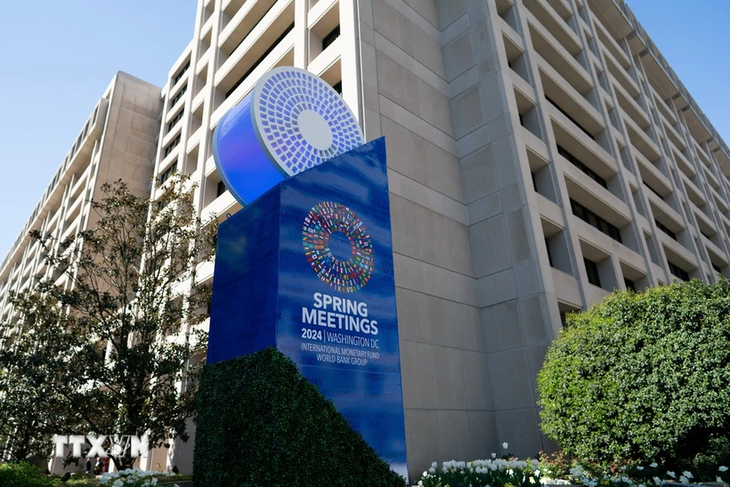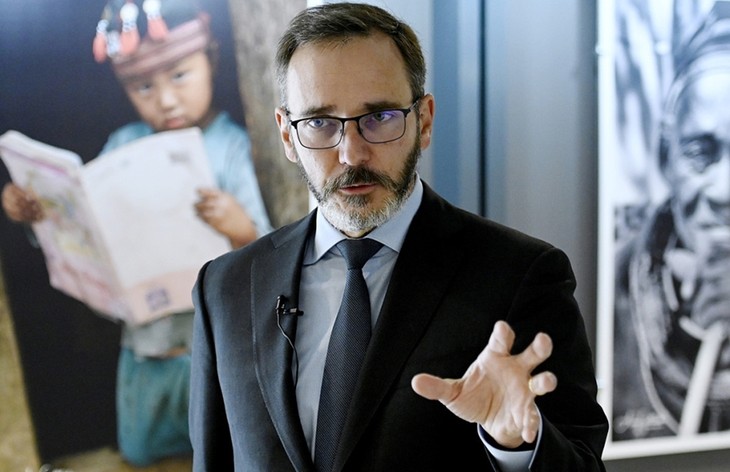(VOVWORLD) - In recent reports on the global economic outlook, most big financial institutions say that the world economy has escaped the threat of recession and is expected to record slight growth this year. But the risks of inflation and geopolitical tensions are still relatively large.
 The IMF headquarters in Washington DC, the US. (Photo: XNA/VNA) The IMF headquarters in Washington DC, the US. (Photo: XNA/VNA) |
The IMF’s World Economic Outlook, released on Tuesday, says the global economy is continuing to grow slightly with several bright spots.
Bright spots
First, the IMF’s baseline forecast is that the world economy will grow 3.2% this year, 0.1% higher than its January forecast. Next year’s global economic growth is also expected to be 3.2%.
Second, global inflation is projected to decline from 5.9% this year to 4.5% in 2025, with a number of economies maintaining high bank interest rates.
IMF chief economist Pierre-Olivier Gourinchas said that, although the growth forecast for this year and next year is much lower than the pre-COVID growth rate, taking into account the instability of the past 2 years, it’s an encouraging prospect. Most countries have overcome the biggest crises of recent years, he said.
“The third is places in the world somewhat less scarring from the crisis of the last four years, the pandemic and cost of living crisis. The global economy is way from its pre-pandemic trend, and we are below that, now we see a number of regions are catching up and closing that gap,” said Gourinchas.
The IMF estimates that the world's largest economy, the US, will grow 2.7% this year, better than the January forecast of 2.1%, but will only expand 1.9% next year. Meanwhile, the global lender has lowered the Eurozone's growth forecast to 0.8% this year, compared to its January forecast of 0.9%.
The IMF also lowered its growth forecast for Germany to 0.2% from 0.5% and for emerging economies Brazil, India, and Russia. China is predicted to grow 4.6% this year, but the IMF might increase this number given the optimistic data coming out of China recently. Other developing economies in Asia received a positive assessment consistent with the comment by Li Baodong, the Secretary General of the Boao Forum for Asia.
“There are increasing uncertainties in Asian economies, but they have also shown strong recovery. The Boao Forum forecasts that regional economic growth and economic integration will maintain strong momentum this year, with very good growth prospects for China, India, Indonesia, Saudi Arabia, and other developing economies in Asia,” Li said.
 IMF chief economist Pierre-Olivier Gourinchas (Photo: AFP) IMF chief economist Pierre-Olivier Gourinchas (Photo: AFP) |
Many risks
Despite relatively optimistic assessments, the IMF also issued several warnings. It said inflation is decreasing in most countries but at a slow pace, prompting central banks to maintain high interest rates in the medium term.
The IMF’s warning is consistent with comments by Jay Powell, Chairman of the US Federal Reserve, who said on Monday that the Fed can’t lower its interest rates yet, because it will take longer than expected for inflation to reach the US central bank’s 2% target.
The IMF predicts that the US budget deficit next year could reach a record high of 7.1% of GDP, much higher than the 2% of GDP predicted for other developed economies. This poses a significant risk to the US economy, other economies, and to global financial stability, according to the IMF.
The conflicts in Ukraine and the Gaza Strip, and escalating tensions between Iran and Israel posed short- and medium-term risks to the world economy. The IMF says that if there is a disruption in the oil supply in the Middle East, global oil prices could increase 15% and then global inflation will increase 0.7%.
“Global growth prospects are also harmed by rising geo‑economic fragmentation. Trade linkages are already changing. Some economies could benefit from the reconfiguration of global supply chains, but the net effect may still be a loss of efficiency, making the global economy less, not more resilient, and the broader damage is to global cooperation,” said IMF chief economist Pierre-Olivier Gourinchas.
The WTO’s Global Trade Outlook published on April 11 said that, since 2018, trade growth between the world's two largest economies, the US and China, has been 30% slower than trade growth between these two countries and other countries.